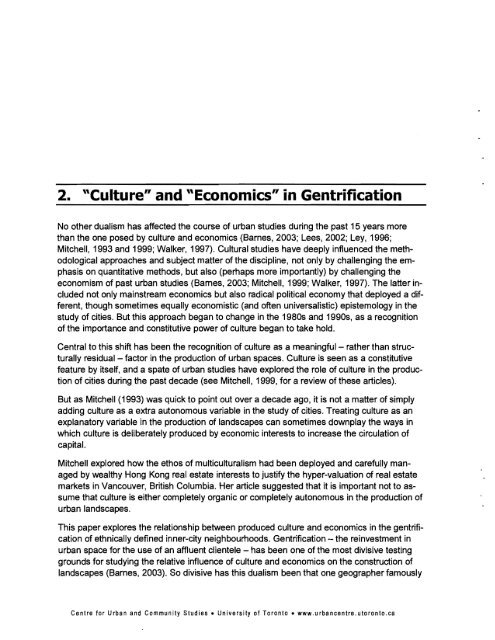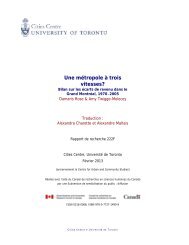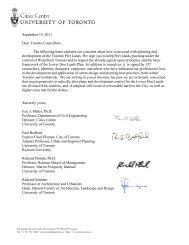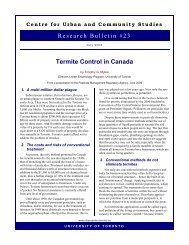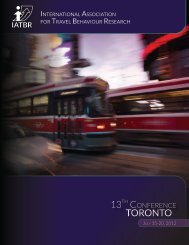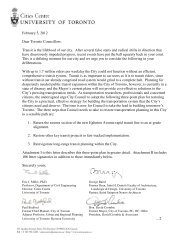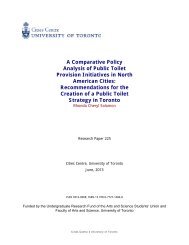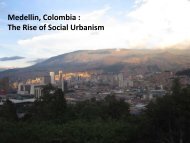2. "Culture" <strong>and</strong> "Economics" <strong>in</strong> <strong>Gentrification</strong>No other dualism has affected the course of urban studies dur<strong>in</strong>g the past 15 years morethan the one posed by culture <strong>and</strong> economics (Barnes, 2003; Lees, 2002; Ley, 1996;Mitchell, 1993 <strong>and</strong> 1999; Walker, 1997). Cultural studies have deeply <strong>in</strong>fluenced the methodologicalapproaches <strong>and</strong> subject matter of the discipl<strong>in</strong>e, not only by challeng<strong>in</strong>g the emphasison quantitative methods, but also (perhaps more importantly) by challeng<strong>in</strong>g theeconomism of past urban studies (Barnes. 2003; Mitchell, 1999; Walker, 1997). The latter <strong>in</strong>cludednot only ma<strong>in</strong>stream economics but also radical political economy that deployed a different,though sometimes equally economistic (<strong>and</strong> often universalistic) epistemology <strong>in</strong> thestudy of cities. But this approach began to change <strong>in</strong> the 1980s <strong>and</strong> 1990s, as a recognitionof the importance <strong>and</strong> constitutive power of culture began to take hold.Central to this shift has been the recognition of culture as a mean<strong>in</strong>gful- rather than structurallyresidual - factor <strong>in</strong> the production of urban spaces. Culture is seen as a constitutivefeature by itself, <strong>and</strong> a spate of urban studies have explored the role of culture <strong>in</strong> the productionof cities dur<strong>in</strong>g the past decade (see Mitchell, 1999. for a review of these articles).But as Mitchell (1993) was quick to pO<strong>in</strong>t out over a decade ago. it is not a matter of simplyadd<strong>in</strong>g culture as a extra autonomous variable <strong>in</strong> the study of cities. Treat<strong>in</strong>g culture as anexplanatory variable <strong>in</strong> the production of l<strong>and</strong>scapes can sometimes downplay the ways <strong>in</strong>which culture is deliberately produced by economic <strong>in</strong>terests to <strong>in</strong>crease the circulation ofcapital.Mitchell explored how the ethos of multiculturalism had been deployed <strong>and</strong> carefully managedby wealthy Hong Kong real estate <strong>in</strong>terests to justify the hyper-valuation of real estatemarkets <strong>in</strong> Vancouver. British Columbia. Her article suggested that it is important not to assumethat culture is either completely organic or completely autonomous <strong>in</strong> the production ofurban l<strong>and</strong>scapes.This paper explores the relationship between produced culture <strong>and</strong> economics <strong>in</strong> the gentrificationof ethnically def<strong>in</strong>ed <strong>in</strong>ner-city neighbourhoods. <strong>Gentrification</strong> - the re<strong>in</strong>vestment <strong>in</strong>urban space for the use of an affluent clientele - has been one of the most divisive test<strong>in</strong>ggrounds for study<strong>in</strong>g the relative <strong>in</strong>fluence of culture <strong>and</strong> economics on the construction ofl<strong>and</strong>scapes (Barnes, 2003). So divisive has this dualism been that one geographer famously<strong>Centre</strong> for Urban <strong>and</strong> Community Studies. University of Toronto. www.urbancentre.utoronto.ca
<strong>Ethnic</strong> <strong>Identity</strong>, <strong>Place</strong> <strong>Market<strong>in</strong>g</strong>, <strong>and</strong> <strong>Gentrification</strong> <strong>in</strong> Toronto3described the oppos<strong>in</strong>g schools as "teams," each with its own "quarterback" (van Weesep,1994).Generally speak<strong>in</strong>g, the "culture school" saw gentrification as a spatial expression of a criticalclass politics (Ley, 1996; Caufield, 1994), built on the notion of consumer dom<strong>in</strong>ance, if notsovereignty. Accord<strong>in</strong>g to this view, neighbourhoods gentrify primarily because tastes <strong>and</strong>preferences have changed. That is, an <strong>in</strong>creas<strong>in</strong>gly large segment of society rejected thesuburbs - because of the distance to work, the isolation, the lack of diversity - <strong>in</strong> favour of<strong>in</strong>ner-city liv<strong>in</strong>g (Laska <strong>and</strong> Spa<strong>in</strong>, 1980; Ley, 1986; Mills, 1988). There is considerable <strong>in</strong>ternaldiversity with<strong>in</strong> this school, but cultural humanism has been the most dom<strong>in</strong>ant <strong>in</strong>fluence.Accord<strong>in</strong>g to the humanist perspective, human be<strong>in</strong>gs, even with<strong>in</strong> a powerful capitalist system,are endowed with a certa<strong>in</strong> degree of decision-mak<strong>in</strong>g autonomy, <strong>and</strong> these decisionsare not easily predictable accord<strong>in</strong>g to simple economic calculus (Ley, 1996).The "economics school," conversely, focuses on the production side of gentrification. It suggeststhat the necessary condition for gentrification to occur is the availability of <strong>in</strong>expensivereal estate. The key explanatory model of this school of thought is the rent gap theory ofSmith (1979a <strong>and</strong> 1996; Badcock, 1989 <strong>and</strong> 1995; Clark, 1995). Many neighbourhoods <strong>in</strong> theadvanced capitalist world experienced massive dis<strong>in</strong>vestment <strong>in</strong> <strong>in</strong>ner-city real estate marketsdur<strong>in</strong>g the mid-twentieth century. One result of this dis<strong>in</strong>vestment was the decl<strong>in</strong>e <strong>in</strong> potentialrent that could be garnered for a given plot of l<strong>and</strong> <strong>in</strong> the <strong>in</strong>ner city. Potential rent is acomplicated concept that is <strong>in</strong> part a function of distance to the central bus<strong>in</strong>ess district; it iscasually expla<strong>in</strong>ed as the value of l<strong>and</strong> at its "highest <strong>and</strong> best use."Accord<strong>in</strong>g to this school of thought, the primary explanation for the gentrification of certa<strong>in</strong>cities lies <strong>in</strong> the concentration of available properties <strong>in</strong> areas where the actual rent is far belowpotential rent. That is, the supply <strong>and</strong> concentration of undervalued <strong>in</strong>ner-city propertiesis the necessary (though not sufficient) condition for gentrification to occur. Though led <strong>in</strong>some cities by <strong>in</strong>dividual owner-occupiers <strong>in</strong> search of <strong>in</strong>expensive hous<strong>in</strong>g, much of the expansionof gentrification has been facilitated by hous<strong>in</strong>g producers, primarily developers, butalso the state (Smith, 1979b; Hackworth <strong>and</strong> Smith, 2001). Accord<strong>in</strong>g to this l<strong>in</strong>e of thought,gentrification is less an organic shift <strong>in</strong> preferences than a produced one. The roots of thisschool lie primarily <strong>in</strong> Marxian economics (Smith, 1982).The recession of the early 1990s <strong>and</strong> its expansionary aftermath were key <strong>in</strong>fluences on thedevelopment of this literature, but largely perpetuated the dualism between economics <strong>and</strong>culture. Bourne (1993a <strong>and</strong> 1993b) <strong>in</strong> particular was quick to po<strong>in</strong>t out that the recession of<strong>in</strong>ner-city real estate markets dur<strong>in</strong>g the downturn was not only a sign of gentrification's demise,but also a validation of the dem<strong>and</strong>-side viewpo<strong>in</strong>t. That is, the downturn was <strong>in</strong> partthe result of people choos<strong>in</strong>g to live <strong>in</strong> the suburbs after the recession as families aged, leav<strong>in</strong>ga comparatively small demographic cohort to consume hous<strong>in</strong>g <strong>in</strong> gentrified neighbourhoods.Those on the "economics" side of this dualism felt otherwise. Smith (1996) went so far as tosuggest that "It may not be too much of an exaggeration to surmise that proclaim<strong>in</strong>g the endof gentrification today may be ak<strong>in</strong> to anticipat<strong>in</strong>g the end of suburbanization <strong>in</strong> 1933" (Smith1996, p. 230). The post-recession period seemed to v<strong>in</strong>dicate Smith, <strong>and</strong> the "economics<strong>Centre</strong> for Urban <strong>and</strong> Community Studies. University of Toronto. www.urbancentre.utoronto.ca
- Page 1 and 2: Centre forUrban andCommunity Studie
- Page 3 and 4: AuthorsJason Hackworth is Assistant
- Page 5 and 6: Table of Contents1. INTRODUCTION ..
- Page 7: 1. IntroductionIt has been more tha
- Page 11 and 12: 3. MethodThis study relies on an ex
- Page 13 and 14: 4. Four Case StudiesLittle Ita IyLi
- Page 15 and 16: Ethnic Identity, Place Marketing, a
- Page 17 and 18: Ethnic Identity, Place Marketing, a
- Page 19 and 20: Ethnic Identity, Place Marketing, a
- Page 21 and 22: Ethnic Identity, Place Marketings a
- Page 23 and 24: Ethnic Identity, Place Marketing, a
- Page 25 and 26: Ethnic Identity, Place Marketing, a
- Page 27 and 28: Ethnic Identity, Place Marketing, a
- Page 29 and 30: 5. Culture, Power, and EconomicsThe
- Page 31 and 32: ReferencesAnderson, K. 1987. The id
- Page 33: Ethnic Identity, Place Marketing, a


